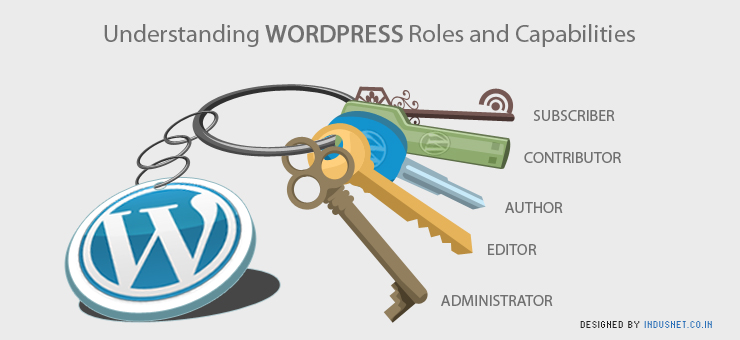
WordPress is one of those irreplaceable tools that we have just taken for granted, expecting it to be there when we need it. Of course, it will continue to serve us faithfully and loyally but do we really understand all the benefits that WordPress provides us, for no cost at all? One of the most underutilized features of WordPress is that of user roles. User roles help you to decide how much authority, freedom and capabilities you can assign to a particular user. If you trust the user a lot, a lot of freedom can be given and if you think the user needs permission for just a few things, only such freedoms and capabilities can be given. With this in mind, it helps to understand the various user roles that WordPress has given to administrators.
WordPress Roles and Capabilities
By default, there are 5 possible user roles that you can assign to a person. They include the roles of an administrator, editor, author, contributor and subscriber. Most web administrators are often left confused and wondering which role suits their employees the best. For this, you will need to spend a little while trying to understand the various features of each role that WordPress lets you assign to users.
WordPress Administrator
An ‘Administrator’ has the maximum amount of freedom and can change the way your website appears, take decisions related to other users and even add or delete previously published posts. In short, an admin has all the freedom that is possible with regard to your website. You should be assigning an admin’s role only to yourself or a trusted partner, unless circumstances demand otherwise. Admins can also view statistics which help them to plan how the website must be managed in future but such information may be seen as critical and an editor need not to what the statistics are, especially if your website has information that is deemed sensitive and confidential.
WordPress Editor
An ‘Editor’ on the other hand can edit, delete, add or make changes to his or her own posts, and also to that of other’s posts. An editor can schedule posts and decide when the posts should go online. If there are many writers on the website, an editor can ensure that there are no mistakes or errors and make corrections in other people’s posts as well. Obviously, you would want an editorial level person to be given the freedoms and capabilities normally associated with the role of an Editor on WordPress.
WordPress Author
An ‘Author’ has the freedom to add or delete posts before publishing and also deciding when to publish a post. He may edit his own posts and be able to make changes even after a post is published. He or she will not be able to edit or delete other people’s posts nor will they be able to gain access to web statistics or plug-in information.
WordPress Contributor
A ‘Contributor’ can only add posts or submit them and will not be able to access any sensitive information. This is great for a writer who has just joined your team. A ‘Subscriber’ on the other hand is just that. He or she will only be able to leave comments and share published posts. A subscriber will not be able to add or edit or access administration the way others will be able to do so. This is a great way to increase interaction with your readers, when you ask them to subscribe.
Managing User Roles and Capabilities on WordPress
Smashing Magazine had published a really informative article about how each user’s capabilities can be altered or manipulated. It may be a good idea to read that, if you are looking for additional information. What we need to remember is that these user roles can be changed according to our requirements. By fixing codes and editing certain tags, you will be able to personalize and customize user roles the way you want to. If you are not able to do this on your own, hiring a goof WordPress professional is a great idea. And good WordPress professionals will not only save your time but also your money in the long run.